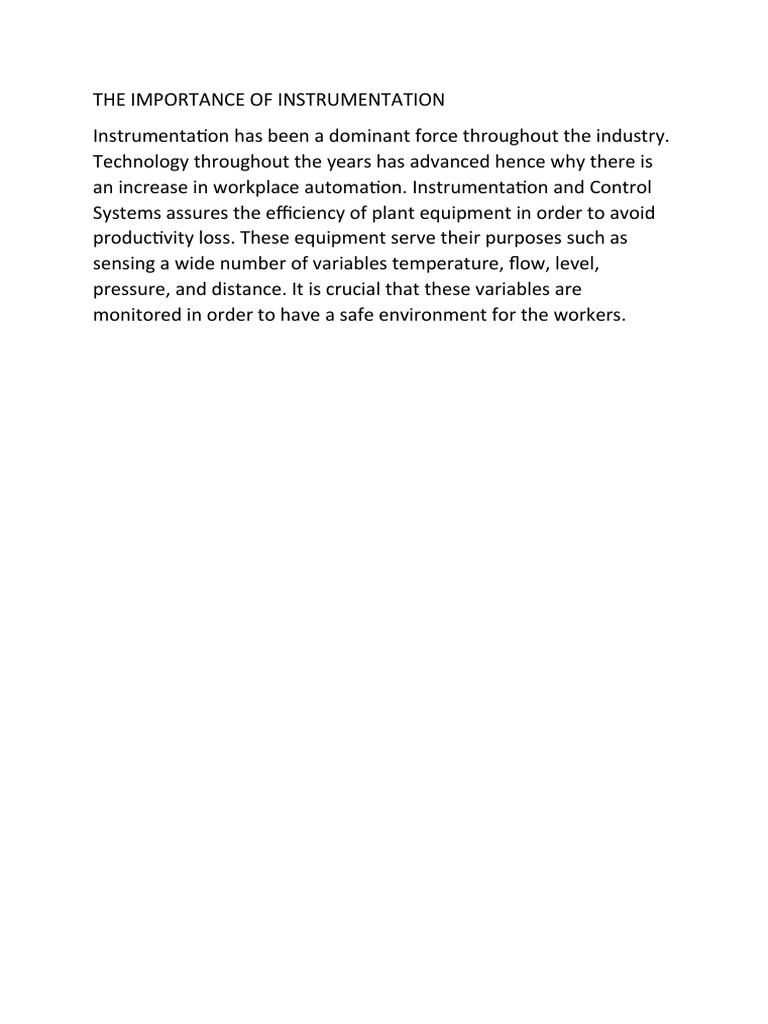Instrumentation, often overlooked in the grand narrative of scientific inquiry, serves as the backbone of empirical research. A meticulous orchestration of tools and techniques, instrumentation encompasses devices that facilitate observation, measurement, and manipulation of experimental variables. As the bridge connecting theoretical postulates with practical validation, the importance of instrumentation cannot be overstated. This essay elucidates the multifaceted significance of instrumentation in research, addressing its inherent complexities and underlying implications for scientific advancement.
At the outset, one might pose a fundamental question: Why does instrumentation matter? The answer, while straightforward, invites a considerable depth of exploration. In the realm of physics, chemistry, biology, and engineering, precise measurements dictate the validity of experimental results. Instrumentation enables researchers to collect data with an unrivaled level of accuracy, thereby anchoring hypotheses in observable reality. Without the sophisticated technologies that underpin modern instrumentation—be it spectrometers, chromatographs, or electron microscopes—the extent of our scientific understanding would be tremendously constrained. This accuracy not only bolsters the credibility of findings but also cultivates trust within the scientific community and the general public.
The nuanced role of instrumentation extends beyond mere measurement. It acts as a catalyst for innovation by enabling novel experimental designs and methodologies. Contemporary researchers are continually striving to transcend the limitations of earlier scientific paradigms, and instrumentation often holds the key. For instance, the advent of high-throughput screening techniques has revolutionized drug discovery processes. By utilizing advanced robotic systems and data analysis frameworks, researchers can assess thousands of compounds simultaneously. This paradigm shift illustrates how instrumentation can accelerate the pace of scientific discovery and lead to transformative breakthroughs in healthcare and beyond.
Furthermore, the interdisciplinary nature of modern research necessitates a convergence of instrumentation across various fields. The complexities of phenomena such as climate change, disease outbreaks, and material degradation require not just specialized instruments but an integrated approach that synthesizes techniques from different scientific domains. Consequently, the development and implementation of instrumentation foster collaboration among disciplines, promoting a cross-pollination of ideas and methodologies. For instance, the fusion of biology with computational science through bioinformatics exemplifies how instrumentation can unify disparate fields, ultimately enriching the research landscape.
Instrumentation also plays a crucial role in data integrity and reproducibility. In an era where scientific reproducibility is under meticulous scrutiny, the ability to reliably replicate results hinges on the precision of the instruments employed. Each analytical device possesses its unique calibration protocols and operational variances, which can significantly influence the outcomes of experiments. A rigorous understanding of instrumentation ensures that researchers can maintain high standards of accuracy, thus mitigating biases and errors that could compromise the validity of their work. As such, a comprehensive grasp of instrumentation not only underlines the quality of research but also safeguards the integrity of the scientific process itself.
The implications of this statement reach far and wide. Researchers often encounter a common bias: the belief that results speak for themselves. However, it is the instrumentation behind these results that lends them credence. Without adequately calibrated instruments, even the most compelling theories risk falling prey to skepticism. Therefore, educational initiatives that highlight the importance of instrumentation in scientific training are paramount. It is essential for budding scientists to cultivate a familiarity with the tools of their trade, fostering an appreciation for the intricate relationship between instrumentation and research efficacy. This foundational knowledge can empower researchers to not only use instruments adeptly but also innovate and troubleshoot effectively.
Moreover, the dynamic nature of technological advancement necessitates a continual evolution in the field of instrumentation. As new materials and methodologies emerge, so too must the instruments that scientists employ. The development of nanotechnology, for example, calls for instrumentation that can operate at the atomic and molecular levels. This adaptability is essential, as it ensures that researchers are equipped to tackle emerging scientific challenges with appropriate tools. The landscape of research is ever-changing, and instrumentation must evolve in tandem, showcasing the symbiotic relationship between technological innovation and scientific inquiry.
Nevertheless, it is essential to acknowledge that the proliferation of advanced instruments can lead to challenges. The complexity of modern scientific equipment often necessitates extensive training and expertise. As systems become more sophisticated, researchers might encounter a steep learning curve, potentially impeding their capacity to harness the full potential of these instruments. Consequently, educational institutions and research organizations must prioritize training programs that not only cover operational use but also delve into the underlying principles governing these technologies. This paradigm shift in research training can enhance the effectiveness of future scientists, equipping them with the requisite skills to navigate the instrumentation landscape effectively.
In conclusion, the importance of instrumentation to research is profound and multifaceted. Through the lens of accuracy, innovative capacity, interdisciplinary collaboration, data integrity, educational imperatives, and adaptability to future challenges, instrumentation emerges as a cornerstone of scientific endeavor. As researchers grapple with the intricacies of the natural world, it becomes increasingly clear that the instruments at their disposal are not mere tools but essential allies in the pursuit of knowledge. The commitment to understanding and advancing instrumentation is a commitment to the very essence of scientific inquiry, embodying the curiosity and ingenuity that drive human progression. Thus, as we stand on the precipice of new discoveries, let us not underestimate the value of instrumentation in shaping the future of research and, by extension, our understanding of the universe itself.










